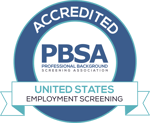
Using Social Media, such as LinkedIn to find, recruit and review applicants may seem like a good idea. But, do you know if you are performing FCRA-regulated activities or violating EEOC/Title VII? The answer may not be as clear as you’d think.
In today’s social world it is more common than not for individuals to have an online presence, especially in social media. As an employer, it may be tempting to join the popular trend of screening prospective employee’s social media profiles for red flags.
Beware! Posts could divulge protected class information. Even if you don’t proceed with the applicant based on discriminatory practices like race, ethnicity or religion (to name a few), knowledge of this information could still have legal implications, or more specifically a civil rights complaint for failure to follow anti-discrimination laws or even disparate impact guidelines. Furthermore, using social media to pre-screen applicants may be considered “background screening” and subject to FCRA regulation.
Social Media as a Recruiting Tool
The Society for Human Resource Management, affectionately known as SHRM, performed a survey in April 2013 that found 77% of employers are recruiting through social networking sites (21% more than the previous survey performed in 2011). Of these companies, 57% do not have a social media screening policy, and 72% do not intend on creating one. (Read more of the SHRM survey here.) Compound this in technology years and you can expect the number have grown.
Not only is social media screening and recruiting trendy, it is becoming an increasingly common practice. Unfortunately, a lucid protocol on using social media does not exist. However, practices gleaned from Labor Laws, EEOC and/or FCRA will be beneficial in drafting your company’s social media policy.
Implications of Background Screening & Recruiting via Social Media
The glaringly apparent legal implications from using social media are discrimination and discrimination by disparate impact. Discrimination can be implied after you’ve read through a candidate’s social media profile because you now have access to information that you may not have prior to or during a conventional interview, specifically the previously mentioned protected class information. Because knowledge of this information during your hiring practice could potentially violate anti-discrimination laws, you may be at risk.
Related article – Making the Decision: My Candidate has a Hit
Disparate impact comes into play when you as an employer exclusively use one social media outlet to recruit or screen candidates. This could have an adverse effect on individuals because of their lack of access to social media, possibly excluding specific classes from consideration.
At Choice Screening, we have policies in place to make sure we provide you with consistent reporting. This helps protect us, our clients and your applicants from irregular, discriminatory and non-compliant practices. Similarly, a well-documented policy advising how to appropriately use Social Media as a recruiting tool may offer the necessary protection for your organization.
A Current Social Media Focus: LinkedIn
The well-known and self proclaimed, “one stop shop for your professional life,” LinkedIn, is currently facing a suit, Sweet v. LinkedIn Corp. This suit alleges LinkedIn violated FRCA laws by providing employers with a prospective candidate’s professional references through a subscription-based application. The class action complaint states, “LinkedIn has created a marketplace in consumer employment information, that may or may not be accurate, and that it has obtained in part from unwitting members, and without complying with the FCRA. In turn, potential employers, among others, obtain that information from LinkedIn, and may make hiring and firing decisions utilizing said information, without providing notice to the persons whose information they have obtained, and without themselves complying with the FCRA.” This implies the belief that LinkedIn is a CRA (credit reporting agency); if true, LinkedIn will be required to comply with FCRA regulation. With this new development as well as any future claims it’s best to put practices in place now that keep your company compliant.
Employers should take heed when utilizing social media in their recruitment and hiring practices. Stay informed on Labor Laws and developments regarding social media (following us will help keep you up with the latest news). Employ a lawyer familiar with Labor Laws as a valuable resource when drafting your social media policy. As always, don’t forget to perform a comprehensive and accurate background screen using a professional agency.
Contact a Choice Screening Account Executive who can help you get started.



